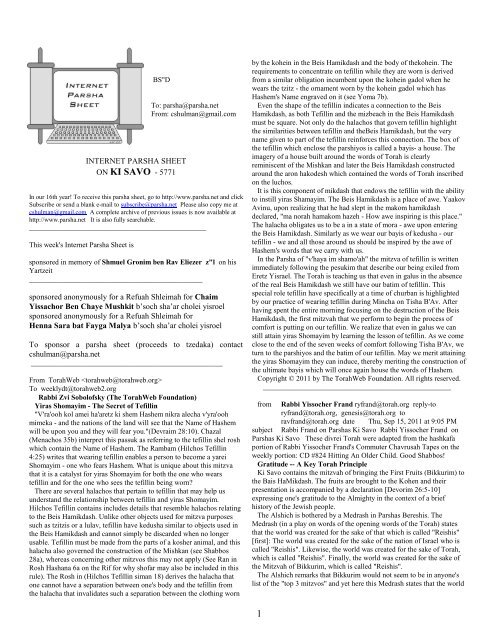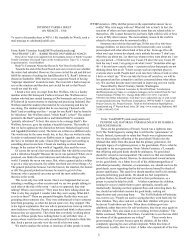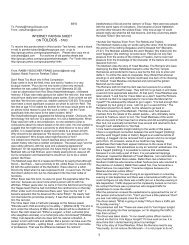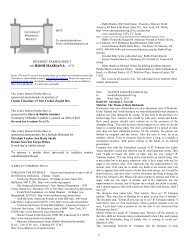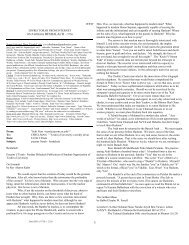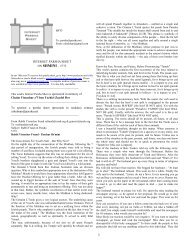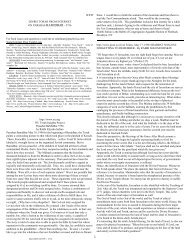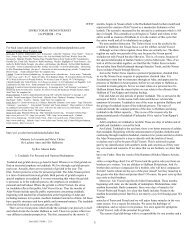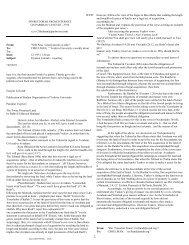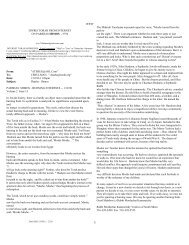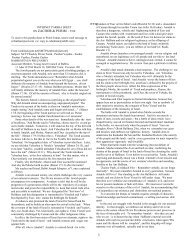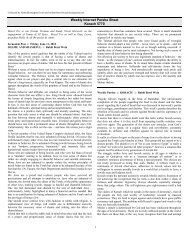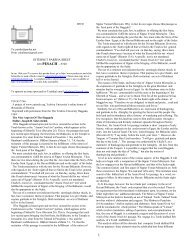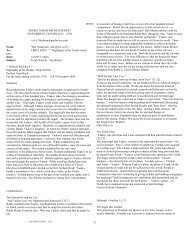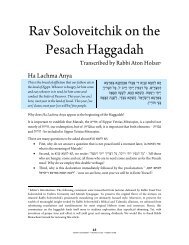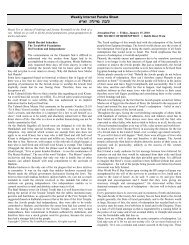1 ON KI SAVO - 5771 - Internet Parsha Sheet
1 ON KI SAVO - 5771 - Internet Parsha Sheet
1 ON KI SAVO - 5771 - Internet Parsha Sheet
You also want an ePaper? Increase the reach of your titles
YUMPU automatically turns print PDFs into web optimized ePapers that Google loves.
BS"D<br />
INTERNET PARSHA SHEET<br />
<strong>ON</strong> <strong>KI</strong> <strong>SAVO</strong> - <strong>5771</strong><br />
To: parsha@parsha.net<br />
From: cshulman@gmail.com<br />
In our 16th year! To receive this parsha sheet, go to http://www.parsha.net and click<br />
Subscribe or send a blank e-mail to subscribe@parsha.net Please also copy me at<br />
cshulman@gmail.com A complete archive of previous issues is now available at<br />
http://www.parsha.net It is also fully searchable.<br />
________________________________________________<br />
This week's <strong>Internet</strong> <strong>Parsha</strong> <strong>Sheet</strong> is<br />
sponsored in memory of Shmuel Gronim ben Rav Eliezer z"l on his<br />
Yartzeit<br />
_______________________________________________<br />
sponsored anonymously for a Refuah Shleimah for Chaim<br />
Yissachor Ben Chaye Mushkit b’soch sha’ar cholei yisroel<br />
sponsored anonymously for a Refuah Shleimah for<br />
Henna Sara bat Fayga Malya b’soch sha’ar cholei yisroel<br />
To sponsor a parsha sheet (proceeds to tzedaka) contact<br />
cshulman@parsha.net<br />
____________________________________________________<br />
From TorahWeb <br />
To weeklydt@torahweb2.org<br />
Rabbi Zvi Sobolofsky (The TorahWeb Foundation)<br />
Yiras Shomayim - The Secret of Tefillin<br />
"V'ra'ooh kol amei ha'aretz ki shem Hashem nikra alecha v'yra'ooh<br />
mimeka - and the nations of the land will see that the Name of Hashem<br />
will be upon you and they will fear you."(Devraim 28:10). Chazal<br />
(Menachos 35b) interpret this passuk as referring to the tefillin shel rosh<br />
which contain the Name of Hashem. The Rambam (Hilchos Tefillin<br />
4:25) writes that wearing tefillin enables a person to become a yarei<br />
Shomayim - one who fears Hashem. What is unique about this mitzva<br />
that it is a catalyst for yiras Shomayim for both the one who wears<br />
tefillin and for the one who sees the tefillin being worn?<br />
There are several halachos that pertain to tefillin that may help us<br />
understand the relationship between tefillin and yiras Shomayim.<br />
Hilchos Tefillin contains includes details that resemble halachos relating<br />
to the Beis Hamikdash. Unlike other objects used for mitzva purposes<br />
such as tzitzis or a lulav, tefillin have kedusha similar to objects used in<br />
the Beis Hamikdash and cannot simply be discarded when no longer<br />
usable. Tefillin must be made from the parts of a kosher animal, and this<br />
halacha also governed the construction of the Mishkan (see Shabbos<br />
28a), whereas concerning other mitzvos this may not apply (See Ran in<br />
Rosh Hashana 6a on the Rif for why shofar may also be included in this<br />
rule). The Rosh in (Hilchos Tefillin siman 18) derives the halacha that<br />
one cannot have a separation between one's body and the tefillin from<br />
the halacha that invalidates such a separation between the clothing worn<br />
by the kohein in the Beis Hamikdash and the body of thekohein. The<br />
requirements to concentrate on tefillin while they are worn is derived<br />
from a similar obligation incumbent upon the kohein gadol when he<br />
wears the tzitz - the ornament worn by the kohein gadol which has<br />
Hashem's Name engraved on it (see Yoma 7b).<br />
Even the shape of the tefillin indicates a connection to the Beis<br />
Hamikdash, as both Tefillin and the mizbeach in the Beis Hamikdash<br />
must be square. Not only do the halachos that govern tefillin highlight<br />
the similarities between tefillin and theBeis Hamikdash, but the very<br />
name given to part of the tefillin reinforces this connection. The box of<br />
the tefillin which enclose the parshiyos is called a bayis- a house. The<br />
imagery of a house built around the words of Torah is clearly<br />
reminiscent of the Mishkan and later the Beis Hamikdash constructed<br />
around the aron hakodesh which contained the words of Torah inscribed<br />
on the luchos.<br />
It is this component of mikdash that endows the tefillin with the ability<br />
to instill yiras Shamayim. The Beis Hamikdash is a place of awe. Yaakov<br />
Avinu, upon realizing that he had slept in the makom hamikdash<br />
declared, "ma norah hamakom hazeh - How awe inspiring is this place."<br />
The halacha obligates us to be a in a state of mora - awe upon entering<br />
the Beis Hamikdash. Similarly as we wear our bayis of kedusha - our<br />
tefillin - we and all those around us should be inspired by the awe of<br />
Hashem's words that we carry with us.<br />
In the <strong>Parsha</strong> of "v'haya im shamo'ah" the mitzva of tefillin is written<br />
immediately following the pesukim that describe our being exiled from<br />
Eretz Yisrael. The Torah is teaching us that even in galus in the absence<br />
of the real Beis Hamikdash we still have our batim of tefillin. This<br />
special role tefillin have specifically at a time of churban is highlighted<br />
by our practice of wearing tefillin during Mincha on Tisha B'Av. After<br />
having spent the entire morning focusing on the destruction of the Beis<br />
Hamikdash, the first mitzvah that we perform to begin the process of<br />
comfort is putting on our tefillin. We realize that even in galus we can<br />
still attain yiras Shomayim by learning the lesson of tefillin. As we come<br />
close to the end of the seven weeks of comfort following Tisha B'Av, we<br />
turn to the parshiyos and the batim of our tefillin. May we merit attaining<br />
the yiras Shomayim they can induce, thereby meriting the construction of<br />
the ultimate bayis which will once again house the words of Hashem.<br />
Copyright © 2011 by The TorahWeb Foundation. All rights reserved.<br />
___________________________________________________<br />
from Rabbi Yissocher Frand ryfrand@torah.org reply-to<br />
ryfrand@torah.org, genesis@torah.org to<br />
ravfrand@torah.org date Thu, Sep 15, 2011 at 9:05 PM<br />
subject Rabbi Frand on <strong>Parsha</strong>s Ki Savo Rabbi Yissocher Frand on<br />
<strong>Parsha</strong>s Ki Savo These divrei Torah were adapted from the hashkafa<br />
portion of Rabbi Yissocher Frand's Commuter Chavrusah Tapes on the<br />
weekly portion: CD #824 Hitting An Older Child. Good Shabbos!<br />
Gratitude -- A Key Torah Principle<br />
Ki Savo contains the mitzvah of bringing the First Fruits (Bikkurim) to<br />
the Bais HaMikdash. The fruits are brought to the Kohen and their<br />
presentation is accompanied by a declaration [Devorim 26:5-10]<br />
expressing one's gratitude to the Almighty in the context of a brief<br />
history of the Jewish people.<br />
The Alshich is bothered by a Medrash in <strong>Parsha</strong>s Bereshis. The<br />
Medrash (in a play on words of the opening words of the Torah) states<br />
that the world was created for the sake of that which is called "Reishis"<br />
[first]: The world was created for the sake of the nation of Israel who is<br />
called "Reishis". Likewise, the world was created for the sake of Torah,<br />
which is called "Reishis". Finally, the world was created for the sake of<br />
the Mitzvah of Bikkurim, which is called "Reishis".<br />
The Alshich remarks that Bikkurim would not seem to be in anyone's<br />
list of the "top 3 mitzvos" and yet here this Medrash states that the world<br />
1
was created for the sake of this mitzvah! What is the meaning of this<br />
Medrash?<br />
The Alshich answers that the mitzvah of Bikkurim contains within it<br />
something that is fundamental to being a human being -- the obligation<br />
for people to express their gratitude and hakaras haTov. HaKaras haTov<br />
is so basic and primary that the whole world's creation was actualized<br />
just for this mitzvah, which teaches us and trains us in the attribute of<br />
gratitude.<br />
The Pirkei D'Rabbi Eliezer [Chapter 7] writes, "There is nothing<br />
harder for the Almighty to live with (as it were) than an ungrateful<br />
person. The reason Adam was exiled from the Garden of Eden was due<br />
to his ingratitude. His sin was not merely eating from the Tree of<br />
Knowledge (Etz HaDaas). For that sin alone, perhaps he could have<br />
remained in Gan Eden. The straw that broke the camel's back, so to<br />
speak, was the fact that in response to G-d's question why he ate from the<br />
Etz HaDaas, Adam said, "The woman you gave me, she gave me the fruit<br />
and I ate it." As Rashi points out, Adam was being ungrateful. G-d<br />
presented him Chava as a gift and Adam complained that she caused him<br />
to sin.<br />
The Medrash continues that our ancestors in the Wilderness also<br />
angered G-d with their failure to recognize His Goodness towards them.<br />
They bemoaned the loss of the "good old days" in Egypt when they had<br />
melons, cucumbers, and garlic, and complained about the Mann.<br />
The Medrash equates the sin of ingratitude with fundamental<br />
theological denial (kefira b'Ikar) of the Almighty. One who is ungrateful<br />
towards his fellow man is ultimately ungrateful towards the Almighty as<br />
well. One who is an ingrate to his boss, his friends, his spouse, his<br />
parents, and his neighbor will eventually come to deny the favors of the<br />
Almighty.<br />
There are many stories about Gedolim. There are stories abou t their<br />
diligence in study; there are stories about their fear of Heaven; there are<br />
stories about their interpersonal kindness; there are stories about their<br />
sterling human character traits. These stories are all true in general<br />
(although each story about each particular Gadol may or may not be 100<br />
percent accurate). However, regarding one attribute, we hear repeatedly<br />
how particularly careful the great men of Israel were about the attribute<br />
of HaKaras haTov.<br />
If I look back to back to my days in Yeshiva and would be asked to<br />
summarize the themes that Rav Ruderman zt‖l emphasized the most,<br />
number one would certainly be Torah learning (limud haTorah) but<br />
number 2 or 3 would have to be showing proper gratitude (being a<br />
"makir tova").<br />
Gedolim practiced what they preached. I recently read a story about<br />
Rav Yaakov Kamenetsky. There was a young man in Torah VoDaath<br />
Yeshiva who was not coming to minyan [prayers]. The faculty tried all<br />
kinds of threats to force him to c ome to minyan, but it was not helping.<br />
They finally went to the Rosh Yeshiva, Rav Yaakov Kamenetsky, and<br />
asked him whether they could expel the boy from the dormitory. Rav<br />
Yaakov gave them permission to throw him out. They told the boy that<br />
he was expelled from the dorm until he started to come to minyan. Then<br />
they told him that the Rosh Yeshiva wanted to see him. The boy figured<br />
"Now I am really in trouble."<br />
When he appeared before Rav Yaakov Kamentesky, the Rosh Yeshiva<br />
asked him: I understand that you have been thrown out of the dormitory.<br />
Where are you going to sleep? The boy told him that he did not have any<br />
alternate arrangements. Rav Yaakov told him, "I want you to sleep in my<br />
house." The boy was shocked and asked the Rosh Yeshiva to explain<br />
why on the one hand, he was throwing him out of the dormitory and on<br />
the other hand, he was inviting him to stay with him.<br />
Rav Kaminetsky explained to the young man: "Your grandfather used<br />
to give money to the Kovno Kollel where I learned in Europe. Since I<br />
was a beneficiary of your grandfather's support to that Kollel, I owe you<br />
a favor and am glad I have the chance to pay it back in this fashion. True,<br />
I cannot let you sleep in the dormitory because you refuse to come to<br />
minyan, but you can sleep in my house, out of appreciation for what your<br />
grandfather did for me.<br />
A similar incident is told with Rav Moshe Feinstein. Many years ago,<br />
Rav Moshe went to a wedding and gave the Choson an envelope with a<br />
wedding present. After the Sheva Brochos, the Choson and Kallah were<br />
opening their envelopes and they found a check from Rabbi Moses<br />
Feinstein from FDR Drive in Manhattan for $500 dollars. When this<br />
story took place, $500 was an enormous amount for a wedding gift. The<br />
Choson told his father that he thought Rav Moshe must have added an<br />
extra zero on the check by mistake. The father, the choson, and the<br />
Kallah together went to Rav Moshe's apartment and asked the great<br />
Torah sage wheth er he in fact had made a mistake in writing the check.<br />
Rav Moshe said, "If I could, I would give you a check for $5,000! Your<br />
grandfather was Rav Pessach Prushkin and I studied with your<br />
grandfather. I felt such gratitude to your zeida that I wanted to give you a<br />
big present; unfortunately I can't afford to give you more than $500."<br />
Rav Hutner used to conduct his Pessach Seder in a very serious mood.<br />
He treated it as a Divine Service and there was no levity or<br />
lightheadedness whatsoever. The atmosphere was like Yom Kippur. One<br />
year they had a guest who was somewhat of a jokester. He kibitzed, he<br />
joked around, and he acted more as if it was Purim than Yom KiPurim.<br />
Rav Shlomo Freifeld was a student of Rav Hutner and said that<br />
something had to be done about this fellow. He asked Rav Hutner for<br />
permission to throw the fellow out of the house. Rav Hutner said "No.<br />
This young man is a nephew of the Alter from Slabodka. If he wants to<br />
he can dance on the table, don't touch h im!" (Rav Hutner in his youth<br />
had been a student of the Alter from Slabodka.) That is how fundamental<br />
Hakaras HaTov is. A person is only considered a ―person‖ i.e. a mentsch<br />
when he appreciates all the many favors that the Almighty does for each<br />
one of us. No matter what the state of our life is, we are so indebted to<br />
the Ribono shel Olam for life itself.<br />
The Chofetz Chaim said at the end of his life "G-d, I wrote the<br />
Mishneh Berura, I wrote the classic volume on Lashon HaRah, I wrote<br />
this and I wrote that (the Chofetz Chaim was a prolific writer). However,<br />
the Chofetz Chaim was not bragging. He is not saying, "G-d look how<br />
much I've done for You." On the contrary, he said "You, G-d, have given<br />
me the opportunity and the privilege to do all these things that I have<br />
done, now what can I do for You in exchange for all these privileges that<br />
You have given me?" This is someone who is Makir Tov. He goes<br />
through life recognizing all that has been done for him. This is funda<br />
mental to being a human being and that is why Bikkurim, which is called<br />
'Reishis', ranks up there with "for the sake of Torah, which is called<br />
'Reishis' and for the sake of Israel, which is called 'Reishis'."<br />
This week's write-up is adapted from the hashkafa portion of Rabbi Yissocher<br />
Frand's Commuter Chavrusah Torah Tapes on the weekly Torah portion. .. Tapes<br />
or a complete catalogue can be ordered from the Yad Yechiel Institute, PO Box<br />
511, Owings Mills MD 21117-0511. Call (410) 358-0416 or e-mail<br />
tapes@yadyechiel.org or visit http://www.yadyechiel.org/ for further information.<br />
Transcribed by David Twersky Seattle, WA; Technical Assistance by Dovid<br />
Hoffman, Baltimore, MD RavFrand, Copyright © 2007 by Rabbi Yissocher Frand<br />
and Torah.org. Join the Jewish Learning Revolution! Torah.org: The Judaism Site<br />
brings this and a host of other classes to you every week. Visit http://torah.org or<br />
email learn@torah.org to get your own free copy of this mailing. Need to change<br />
or stop your subscription? Please visit our subscription center,<br />
http://torah.org/subscribe/ -- see the links on that page. Permission is granted to<br />
redistribute, but please give proper attribution and copyright to the author and<br />
Torah.org. Both the author and Torah.org reserve certain rights. Email<br />
copyrights@torah.org for full information. Torah.org: The Judaism Site Project<br />
Genesis, Inc. 122 Slade Avenue, Suite 250 Baltimore, MD 21208<br />
http://www.torah.org/ learn@torah.org (410) 602-1350<br />
___________________________________________________<br />
2
From Destiny Foundation/Rabbi Berel Wein<br />
info@jewishdestiny.com via rabbiwein.ccsend.com reply-to<br />
info@jewishdestiny.com date Thu, Sep 15, 2011 at<br />
11:53 AM<br />
Weekly <strong>Parsha</strong><br />
from Rabbi Berel Wein<br />
- <strong>Parsha</strong>t Ki Tavo <strong>5771</strong><br />
Jerusalem Post<br />
BLESSINGS AND …<br />
Monday, September 12, 2011<br />
This week’s parsha emphasizes the subject of blessings and also of<br />
less pleasant predictions. The problem with blessings and seemingly<br />
negative statements and occurrences is that they are not readily or easily<br />
identifiable as being positive or negative. Many times in life what looked<br />
like a blessing at the time turned out to be really a very negative event in<br />
the long run and what looked like an unfortunate negative statement or<br />
occurrence eventually became a source of salvation and blessing. We<br />
are all familiar with the story of the man who cursed his luck at arriving<br />
too late to take up his cabin on the Titanic. His bad luck, so to speak,<br />
was truly what saved his life and his family’s existence. Good times<br />
often lead to disastrous consequences later just as hardships and travail<br />
often produce most positive results and accomplishments in the fullness<br />
of time. We all cheered peace agreements that apparently were great<br />
and good but in actuality were only the precursor of later violence and<br />
wars. We reveled in obtaining free loan money only to have to pay the<br />
piper when the general economy, as a result of our previous apparent<br />
good fortune, collapsed and brought undue hardships. Since life is so<br />
unpredictable, it is obvious that quick judgments as to what is truly a<br />
blessing, personally or nationally, should be held in abeyance. Not<br />
always what we are convinced is going to be good for us turns out to be<br />
actually beneficial or positive. The Torah warns us not to be overly<br />
clever and sanguine about unfolding events. Human eyesight is very<br />
limited. For everything that occurs in life carries with it some ambiguity<br />
and uncertainty. Therefore the Torah insists that we be tamim – simple,<br />
whole, almost naïve – in our assessments of events. Faith in God is the<br />
only certainty that remains for humans to trust in. Even though there is<br />
strict separation of church and state in the United States, the dollar bill<br />
proclaims that ―In God We Trust.‖ Only the Lord truly knows what<br />
events will actually turn out to be blessings. Therefore the great Chasidic<br />
masters all proclaim that Jews should pray to the Lord and state that<br />
―what is good in Your eyes, so to speak, is what we wish to occur.‖<br />
Long ago, my teachers in yeshiva taught us to be careful what we pray<br />
for as the Lord may actually hear our request and grant it - and that what<br />
we pray for does not always turn out to be of true benefit to us. The great<br />
sage, Rabbi Yisrael Meir Kagan (Chafetz Chaim) stated that there are<br />
people who can handle great wealth and thus it can be a great blessing to<br />
them and yet there are others who are unable to deal with being very<br />
wealthy (especially if it happens suddenly to them) and thus the blessing<br />
eventually turns out to be a curse for them and their families. I know<br />
from my own personal experience in the rabbinate, that there were<br />
people who when they earned a middle class salary were wonderful, and<br />
when they had fortune seemingly smile upon them and they suddenly<br />
became very wealthy they became insufferable to others and eventually<br />
even to themselves. As the new year approaches we all pray for the<br />
blessings of a time of true peace and prosperity that we can handle, and<br />
family harmony and contentment. But the wise person will keep his or<br />
her laundry list of requests from Heaven short. Rather, we should submit<br />
ourselves to Heaven’s wishes and accept that whatever is a good in the<br />
Lord’s eyes, so to speak, is good for us as well. In a world of incessant<br />
and insatiable demands for more of everything that is material - and thus<br />
transient, it would be true to Jewish tradition for us to be more humble<br />
and sparing in our demands and requests. The truth is that there is very<br />
little that we actually need though there is much that we want. The<br />
ability to deal with this contradiction in our lives between need and want<br />
is the key to spirituality and to contentment in this world. This idea is<br />
reinforced throughout the Torah and rabbinic writings. Judaism does not<br />
preach poverty or its virtues. But it certainly does preach moderation in<br />
all matters for only in moderation can true blessing be found and<br />
achieved. We wish to be blessed but we also wish to have blessings in a<br />
degree and kind that we can absorb and exploit correctly. And that is<br />
what our prayer should be. Shabat shalom. Berel Wein<br />
----------------------------------------------------------------------<br />
From Destiny Foundation/Rabbi Berel Wein<br />
info@jewishdestiny.com via rabbiwein.ccsend.com<br />
info@jewishdestiny.com dateThu, Sep 15, 2011 at 11:53 AM<br />
Weekly <strong>Parsha</strong> from Rabbi Berel Wein - <strong>Parsha</strong>t Ki Tavo <strong>5771</strong><br />
Rabbi Wein 16 Elul <strong>5771</strong> / 15 September 2011<br />
Weekly <strong>Parsha</strong><br />
<strong>KI</strong> TAVO<br />
Friday, September 16, 2011<br />
The main part of the parsha is concerned with the description of the<br />
woes that will befall the Jewish people in their long years of exile and<br />
persecution. The Torah sees this as being a form of redemptive<br />
punishment for the Chosen People who chose to imitate the idolatrous<br />
and immoral ways of the general society. However, as the exile of<br />
Israel stretched into centuries and then into millennia, the Jews began to<br />
feel that somehow the punishment was rather excessive relative to the<br />
crime. Therefore other explanations for the length and bitterness of the<br />
exile of Israel were advanced. The Talmud itself, hundreds of years<br />
after the destruction of the Second Temple, offered that the scattering of<br />
the Jewish people throughout the world was to allow non-Jews who<br />
wished to convert to Judaism be afforded the opportunity to do so.<br />
Others suggested that the dispersal of the Jewish Diaspora was to allow<br />
Judaic values and attitudes to penetrate the non-Jewish world as well.<br />
It was through the bitter exile itself that the Jewish people would fulfill<br />
its mission of being a light unto the nations of the world. The survival of<br />
the Jewish people under the oppressive conditions of its exile also raised<br />
questions and problems for the Christian world. The concept of the<br />
―Witness People‖ gained currency in the Christian world – that somehow<br />
Jews had to survive to ―witness‖ the eventual reappearance of the<br />
Christian savior and finally convert to Christianity. Thus the Church<br />
established the institution of the ―Pope’s Jews‖ who were protected from<br />
harm since they had to survive to be the ―Witness People.‖ Be all of this<br />
as it may, what is clear is that every word of the Torah regarding the fate<br />
of the Jews in exile has come true – true literally and not allegorically.<br />
As the Ramban phrased it, it is astounding that a book written thousands<br />
of years before the events occurred should record those events so<br />
truthfully and faithfully. It is of comfort that since the tragedies<br />
recited in the parsha that would befall Israel have all come true literally<br />
that we can be certain that the blessings and redemption similarly told to<br />
us in the parsha shall also undoubtedly be fulfilled literally. Some of<br />
them have already been realized in our time with the ingathering of the<br />
exiles of Israel to the nascent Jewish state. Others are still developing<br />
and coming. The Torah never placed any time limits either on Jewish<br />
exile or redemption. The Lord has His own reckoning that no human can<br />
be privy to. The rabbis, therefore, strongly discouraged prognostications<br />
of dates for the arrival of the redemption and the messianic era. Over<br />
the many centuries of Jewish exile, many dates were forecast to be the<br />
ones of redemption, but all of them have come and gone and the<br />
redemption is yet unfulfilled in actuality or completeness. Yet our hope<br />
and belief in our eventual redemption has never waned. ―Next year in<br />
Jerusalem‖ has been fulfilled. Next year in a fully rebuilt and peaceful<br />
Jerusalem is in the wings of the drama that unfolds now before our very<br />
eyes. Shabat shalom.<br />
3
Rabbi Berel Wein U.S. Office 386 Route 59 Monsey, NY 10952 845-368-<br />
1425 | 800-499-WEIN (9346) Fax: 845-368-1528 Questions?<br />
info@jewishdestiny.com Israel Office P.O. Box 23671 Jerusalem, Israel 91236<br />
052-833-9560 Fax: 02-586-8536 Questions? scubac@netvision.net.il SSL<br />
Certificates RabbiWein.com © 2011 The Destiny Foundation Call 845-368-<br />
1425 Phone to call with<br />
____________________________________________________<br />
from Center for Return cfrweeklyparsha@centerforreturn.org<br />
date Thu, Sep 15, 2011 at 3:02 PM<br />
subject CFR Weekly Torah Portion: 'Ki Tavo' ~ Friday, September 16,<br />
2011<br />
CFR Weekly Torah Portion: 'Ki Tavo' ~ Friday,<br />
Torah Thought from the Weekly Portion<br />
By Rabbi Avrohom Dov Kahn<br />
Ki Tavo "...because you did not serve the Lord, your God, with<br />
happiness and with gladness of heart, when [you had an] abundance of<br />
everything." Deuteronomy 28:47 In this week's portion, there are<br />
55 verses describing the horrific punishments inflicted on the Jewish<br />
People if they fail to observe the Torah. The explanation given for this<br />
punishment is given in the above verse toward the end of the Tochecha<br />
(admonishment). It seems strange that the reason given for us being<br />
punished so severely is because of not being happy! Isn't the reason<br />
expressed clearly in the first verse of the tochecha? And it will be,<br />
if you do not obey the Lord, your God, to observe to fulfill all His<br />
commandments and statutes which I am commanding you this day, that<br />
all these curses will come upon you and overtake you. (28:15)<br />
Aren't these punishments a result of not fulfilling the commandments of<br />
G-d as given in the Torah? The answer is: not being happy is not the<br />
sin, but the cause of the sin. The reason we are punished is because<br />
we transgressed the commandments of the Torah as clearly stated in<br />
verse 28:15. The reason we transgressed, is because we did not see the<br />
beauty and happiness that results from keeping G-d's wonderful<br />
commandments. We took it as a chore and burden, not as a privilege and<br />
spiritual delight. Our job before Rosh Hashanah is to resolve to do<br />
everything in our power to sensitize ourselves to the delight and<br />
privilege of keeping the Torah. In that way we will merit to receive all<br />
the blessings of the coming New Year. Have a wonderful Shabbos!<br />
___________________________________________________<br />
From: Kol Torah [koltorah@koltorah.org] Kol Torah Webmaster to<br />
Kol, bcc: me show details 7:16 PM (4 hours ago) Parashat Ki Tavo<br />
17 Elul <strong>5771</strong> September 17, 2011 Vol. 21 No.2<br />
Flowing with Milk and Honey<br />
by Rabbi Ezra Wiener<br />
Ki Tavo begins with a description of the commandment of Bikurim<br />
and its accompanying confession, Viduy, which is recited in front of the<br />
Kohein at the time that one brings his first fruit to the Beit HaMikdash.<br />
The Viduy concludes with the Pasuk, ―Hashkifah MiMe’on Kodshecha<br />
Min HaShamayim UVareich Et Amecha Et Yisrael VeEt HaAdamah<br />
Asher Natata Lanu KaAsher Nishba’ta LaAvoteinu Eretz Zavat Chalav<br />
UDevash,‖ ―Look down from Your holy place, and bless Bnei Yisrael,<br />
and the land You have given them, as You swore to our forefathers, a<br />
land of milk and honey‖ (Devarim 26:15).<br />
The Meforshim are sensitive to the fact that the Pasuk mentions that<br />
Eretz Yisrael was promised to our forefathers as a ―land flowing with<br />
milk and honey.‖ The obvious question that they raise is that Eretz<br />
Yisrael was never promised to Avraham and Yaakov as an Eretz Zavat<br />
Chalav UDevash!<br />
The first time we encounter this phrase is in Parashat Shemot, when<br />
Hashem speaks to Moshe at the Sneh. Hashem says ―VaEireid LeHatzilo<br />
MiYad Mitzrayim, ULeHa’aloto Min HaAretz HaHi, El Eretz Tovah<br />
URechavah, El Eretz Zavat Chalav UDevash,‖ ―And I will come down to<br />
deliver them out of the hands of the Egyptians, and to bring them up out<br />
of that land, into a good and large land, flowing with milk and honey‖<br />
(Shemot 3:8).<br />
Rashi comments that the confessor in Parashat Ki Tavo is making two<br />
separate statements: ―Hashem, look down from Your heavenly abode<br />
and bless the land that was promised to Avraham, Yitzchak, and<br />
Yaakov,‖ and ―You, Hashem, have also fulfilled Your promise (not to<br />
the Avot, but to those who left Egypt) to deliver us to a land flowing<br />
with milk and honey.‖ In fact, the Siftei Chachamim claims that the<br />
confessor is affirming that Hashem indeed provided us with even more<br />
blessings than He originally promised to our Avot.<br />
Ibn Ezra suggests that ―Eretz Zavat Chalav UDevash‖ is a Tefillah.<br />
The farmer who brings Bikurim to the Beit HaMikdash prays that<br />
Hashem continue to preserve the land of Israel as a land flowing with<br />
milk and honey.<br />
Ramban maintains that the word ―LaAvoteinu‖ in the Viduy can refer<br />
to those who left Egypt. It is not uncommon for the Torah to refer to<br />
previous generations as our forefathers. It is not a term exclusively<br />
reserved for Avraham, Yitzchak, and Yaakov. In addition, Ramban<br />
explains that even if we were to explain that ―LaAvoteinu‖ refers to the<br />
Avot, it would not be incorrect for the Torah to state that ―Eretz Zavat<br />
Chalav UDevash‖ was promised to them. After all, if they were promised<br />
Eretz Yisrael, and Eretz Yisrael is later described as a land flowing with<br />
milk and honey, it can be concluded that an ―Eretz Zavat Chalav<br />
UDevash‖ was promised to our forefathers.<br />
The Ketav Sofer wonders why Eretz Yisrael wasn’t promised to<br />
Avraham, Yitzchak, and Yaakov as ―Eretz Zavat Chalav UDevash.‖ Why<br />
was this reserved for the Yotz’ei Mitzrayim?<br />
He explains that the purpose of the Berachot for rains in the correct<br />
time and abundant produce in the land of Israel are not merely rewards<br />
for following Hashem’s commandments. Rather, they are Hachanot<br />
LeAvodat Hashem – Hashem providing us with the capacity to continue<br />
serving Him. The challenge for one to serve Hashem when he can’t<br />
provide for his family is often too great, leaving the person with a feeling<br />
of hopelessness that impedes his service of G-d.<br />
There are certain unique individuals who are able to serve Hashem<br />
under the most trying of circumstances, but this doesn’t represent the<br />
whole nation, nor is it Hashem’s will to place all of Am Yisrael in such a<br />
predicament.<br />
Our Avot did not need a guarantee of ―Eretz Zavat Chalav UDevash‖<br />
to ensure their commitment to Hashem. However, Bnei Yisrael, the<br />
Yotz’ei Mitzrayim, and those who entered Eretz Yisrael, did not possess<br />
the same devotion to the Ribono Shel Olam.<br />
On a Midrashic level, this can furnish a new interpretation of the Pasuk<br />
in Shemot 3:8: in order for this nation to experience a Ha’ala’ah – an<br />
ascent in Avodat Hashem – they will need an Eretz Zavat Chalav<br />
UDevash. There is no mention in this Pasuk that Eretz Yisrael is the land<br />
promised to the Avot; on the contrary, the Pasuk concludes, ―El Mekom<br />
HaKena’ani VeHaChiti VeHaEmori VeHaPerizi VeHaChivi<br />
VeHaYevusi,‖ ―The land of the Kena’anim, Chitim, Emorim, Perizim,<br />
Chivim, and Yevusim.‖<br />
As we approach the Yemei HaDin and we focus our attention on<br />
Parnasah and good health for ourselves and our families, we mustn’t lose<br />
sight of the reason we are asking for Hashem’s Brachot. We wish to<br />
enhance our Avodat Hashem, and we are asking in order to realize that if<br />
there are obstacles in our life, we have a duty to turn those obstacles into<br />
opportunities for growth in Torah and Mitzvot.<br />
___________________________________________________<br />
From Rabbi Mordechai Kornfeld Kollel Iyun Hadaf<br />
to daf-insights<br />
INSIGHTS INTO THE DAILY DAF<br />
Jul 02, 2008<br />
4
ought to you by Kollel Iyun Hadaf of Yerushalayim<br />
daf@dafyomi.co.il, http://www.dafyomi.co.il<br />
SOTAH 38 (28 Sivan) - Dedicated in memory of Hagaon Rav Yisroel Zev (ben<br />
Rav Avrohom Tzvi) Gustman, zt"l, Rosh Yeshiva of Yeshivas Netzach Yisrael-<br />
Ramailes (Vilna-Brooklyn-Yerushalayim), author of "Kuntresei Shi'urim" and<br />
renowned Dayan in pre-war and post-war Vilna, on his 17th Yahrzeit. Dedicated<br />
by Harav Avraham Feldman of Yerushalayim, Dr. Yehoshua Daniel of Efrat, and<br />
Rabbis Eliezer and Zalman Stern of New York, who merited to study under the<br />
Rosh Yeshiva zt"l in Yerushalayim. SOTAH 40 (30 Sivan) - Dedicated by Dr.<br />
Alain Bitton of Geneva, Switzerland, in memory of his grandmother, Freha bat<br />
Haviva Bitton a"h. *Renew Your $54 Yearly Membership*<br />
www.dafyomi.co.il/sponsors.htm ; Postal address is D.A.F., 140-32 69 Ave.,<br />
Flushing NY 11367 USA<br />
Sotah 36<br />
1) AGADAH: THE ORDER OF THE CURSES AND BLESSINGS<br />
The Gemara points out that the division of the Shevatim who stood on<br />
Har Gerizim and Har Eival resembled no other division in history in<br />
which the Shevatim were divided into two groups. Six tribes which<br />
descended from Yakov's primary wives (Rachel and Leah) stood upon<br />
Har Gerizim, while the four tribes which descended from Bilhah and<br />
Zilpah, along with the descendants of Leah's oldest and youngest sons,<br />
stood upon Har Eival, as follows: Shimon, Levi, Yehudah, Yisachar,<br />
Yosef, and Binyamin stood on Har Gerizim, while Reuven, Gad, Asher,<br />
Zevulun, Dan, and Naftali stood on Har Eival.<br />
A careful examination reveals a direct correlation between the order in<br />
which the Shevatim were listed at Har Gerizim and Har Eival, and the<br />
Berachos and Kelalos which they accepted upon themselves there.<br />
The Torah lists twelve curses to be pronounced during this ceremony<br />
(Devarim 27:15-26). The number twelve was chosen presumably<br />
because it corresponds to the number of the tribes of Yisrael (Ba'alei<br />
ha'Tosfos; Chizkuni). In truth, however, the first eleven curses are<br />
summarized by the twelfth, most general, curse: "Cursed be the one who<br />
does not accept upon himself to fulfill all of the commandments of the<br />
Torah." This curse, however, seems to render all of the preceding, more<br />
specific curses extraneous. Rashi (Devarim 27:24) explains that the<br />
preceding eleven curses were intended to correspond to eleven of the<br />
twelve tribes, while the twelfth curse was directed towards the entire<br />
nation. Which tribe was not relegated a curse? Rashi explains that it was<br />
the tribe of Shimon. Moshe Rabeinu did not want to direct a curse<br />
towards Shimon since he did not intend to direct a *blessing* towards<br />
that tribe before he passed away, as he did with the other tribes.<br />
Rashi apparently means to explain simply why the number eleven was<br />
chosen for the number of curses. He does not seem to explain any direct<br />
correlation between each of the curses and a specific tribe. The<br />
ABARBANEL attempts to link each curse to a specific tribe, although<br />
he does so in no particular order. The PIRCHEI NISAN (by the author<br />
of KOHELES YITZCHAK) to <strong>Parsha</strong>s Vayishlach suggests that each of<br />
the curses corresponds to a tribe in a very clear order; specifically, the<br />
order in which the tribes are listed in the section of the Torah which lists<br />
the eleven curses (Devarim 27:12-13). With the exception of Shimon, to<br />
whom no curse was directed according to Rashi, each of the eleven<br />
curses corresponds to a different tribe in the order in which they are<br />
listed in these verses. The Pirchei Nisan asserts that this order provides<br />
insight into a statement made by the Gemara in Shabbos. The Gemara in<br />
Shabbos (55b) states that "whoever says that Reuven sinned is<br />
mistaken.... What, then, does the verse mean when it says, 'Reuven slept<br />
with Bilhah, his father's concubine' (Bereishis 35:22)? Reuven moved<br />
his father's bed out of Bilhah's tent, and the Torah considered it as<br />
though he had slept with her." Rebbi Shimon ben Elazar there adds,<br />
"The righteous [Reuven] is absolved from sin in this matter. How could<br />
it be that Reuven's children would stand upon Har Eival and say,<br />
'Cursed is the one who sleeps with his father's wife,' if Reuven had<br />
himself done so?"<br />
Rebbi Shimon ben Elazar proves Reuven's innocence by showing that<br />
Reuven's descendants answered "Amen" on Har Eival. Hashem certainly<br />
was not asking them to accept a curse upon themselves. According to<br />
the Pirchei Nisan's assertion, however, the Gemara means much more<br />
than that.<br />
"Cursed is the one who sleeps with his father's wife" is the sixth curse<br />
in the list. Excluding Shimon, Reuven is the sixth tribe mentioned in the<br />
list of the tribes which stood upon the two mountains. Rebbi Shimon<br />
ben Elazar, therefore, says that the curse for sleeping with the wife of<br />
one's father was addressed *specifically* towards Reuven. Since these<br />
curses were part of the establishment of a covenant, Hashem would not<br />
have directed this curse to a tribe which did not fulfill its directive.<br />
Rather, Hashem must have addressed that curse (and its corresponding<br />
blessing) towards the tribe of Reuven in order to make it clear that<br />
Reuven was free of condemnation for that incestuous act. Their forebear<br />
was hence vindicated from suspicion for such a transgression.<br />
The Pirchei Nisan writes further that *each* of the eleven curses was<br />
appropriate to the particular tribe toward which it was directed. Although<br />
he explains only the first six of the curses, the TECHELES<br />
MORDECHAI (ha'Rav Mordechai Drucker of Strya, Hungary), <strong>Parsha</strong>s<br />
Ki Savo, resolves all of them based on the Pirchei Nisan's approach.<br />
(The following summary includes some explanations suggested by<br />
Rabbis Gedalyah Press and M. Kornfeld. See also Mei ha'Shilo'ach<br />
(Izhbitz), vol. II, <strong>Parsha</strong>s Ki Savo.)<br />
The working assumption is that the Torah links a curse to a particular<br />
tribe either (a) to show that the sin mentioned in the curse *cannot* be<br />
attributed to that tribe, as mentioned above with regard to Reuven, (b)<br />
because that tribe was *outstanding* in that respect, or (c) because that<br />
tribe was more *susceptible* than the others to sin in such a manner, and<br />
thus needed a more direct warning.<br />
1. LEVI. "Cursed is the one who makes idols." The tribe of Levi was<br />
the only tribe which did not serve the Egel ha'Zahav (see Rashi to<br />
Devarim 33:9). (Pirchei Nisan)<br />
2. YEHUDAH. "Cursed is the one who shows disrespect to his<br />
parents." Yehudah promised his father that he would return Binyamin<br />
unscathed, and then he risked his life to fulfill his promise for the sake<br />
of his father (Bereishis 42:32). (Pirchei Nisan)<br />
3. YISACHAR. "Cursed is the one who tries to take for himself his<br />
neighbor's property." Yisachar was conceived when Leah claimed<br />
Yakov for herself even though it was Rachel's night. However, she paid<br />
Rachel in full for the privilege (Bereishis 30:16). (Pirchei Nisan)<br />
Moreover, Yisachar's leader brought his sacrifices (during the<br />
dedication ceremony of the Mishkan) before Reuven's leader. Reuven's<br />
leader complained that he rightfully should be first, since his tribal<br />
forebear was older, but Hashem supported Yisachar's leader, saying that<br />
it was rightfully Yisachar's turn after all (Rashi to Bamidbar 7:19).<br />
(Techeles Mordechai)<br />
4. YOSEF. "Cursed is the one who misleads the blind on the road."<br />
When Yosef was on the road trying to locate his brothers, he "blindly"<br />
trusted that they would do him no harm. They, however, took advantage<br />
of him and harmed him. Thus, he was the only one of the brothers who<br />
did not mislead the blind. (Pirchei Nisan)<br />
Alternatively, when Yosef was viceroy of Mitzrayim, his brothers<br />
"blindly" stumbled upon him. Although they did not know who he was,<br />
Yosef did not take advantage of that fact to take revenge. (M. Kornfeld)<br />
5. BINYAMIN. "Cursed is the one who does injustice to a proselyte,<br />
orphan or widow." Binyamin was an orphan, and thus this curse<br />
protected him. (Pirchei Nisan)<br />
6. REUVEN. "Cursed is the one who sleeps with his father's wife." As<br />
explained above, the Torah addressed this curse to the tribe of Reuven<br />
to make it clear beyond any doubt that Reuven was free of<br />
condemnation for that sin. Addressing this curse to the descendants of<br />
5
Reuven officially vindicated Reuven from having committed such a<br />
transgression. (Pirchei Nisan)<br />
7. GAD. "Cursed is the who cohabits with an animal." The people of<br />
Gad gave precedence to their animals even over their own children<br />
when they chose their portion of Eretz Yisrael based on where the best<br />
grazing grounds are located (Rashi, Bamidbar 32:16). It was therefore<br />
necessary to warn them of this transgression more than the other tribes.<br />
(M. Kornfeld)<br />
8. ASHER. "Cursed is the one who cohabits with his sister." The<br />
women of the tribe of Asher were particularly beautiful (Rashi, Devarim<br />
33:24), and thus Asher needed to be warned of this transgression more<br />
than the other tribes. (Techeles Mordechai)<br />
9. ZEVULUN. "Cursed is the one who cohabits with his mother-inlaw."<br />
The members of the tribe of Zevulun were merchants who sailed<br />
long distances to trade their goods with other nations (Rashi, Devarim<br />
33:18). While they were away, their wives would move-in with their<br />
mothers so that the women could help each other while their husbands<br />
were away at sea. Special warning must be given to the man whose wife<br />
and mother-in-law live under the same roof, since a man might become<br />
fond of his mother-in-law (Bava Basra 98b; Pesachim 103a). (Rav G.<br />
Press)<br />
10. DAN. "Cursed is the one who smites his friend secretly" (who<br />
slanders his friend; Rashi). Dan is compared to a "snake" who "bites the<br />
hooves of the horses" of his enemy (Bereishis 49:17). He must be<br />
warned to direct his destructive energies against the enemy and not to<br />
use the character of a snake to slyly hurt others from his own nation.<br />
(The Midrash associates the snake with slander. See, for example,<br />
Tanchuma, Metzora #2.) (M. Kornfeld)<br />
11. NAFTALI. "Cursed is the one who accepts a bribe to kill the<br />
innocent." Naftali was so named because he was born after Rachel used<br />
every means at her disposal ("Naftulei... Niftalti") to beg Hashem to<br />
grant her children through her maidservant (Bereishis 30:8). Naftali,<br />
therefore, had a tendency to attempt to attain his will through any<br />
means, however illicit, and thus he in particular needed to be warned not<br />
to be involved with bribes. (Rav G. Press)<br />
_____________________________________________________<br />
from Yeshivat Har Etzion office@etzion.org.il reply-to Yeshivat Har<br />
Etzion to yhe-sichot@etzion.org.il date Thu, Sep 15,<br />
2011 at 7:18 AM subject VBM-SICHOT71 -50: Parashat Ki Tavo hide<br />
details 7:18 AM (16 hours ago) YESHIVAT HAR ETZI<strong>ON</strong> ISRAEL<br />
KOSCHITZKY VIRTUAL BEIT MIDRASH (VBM)<br />
STUDENT SUMMARIES OF SICHOT OF THE ROSHEI YESHIVA<br />
www.vbm-torah.org/archive/sichot71/50-71kitavo.htm<br />
PARASHAT <strong>KI</strong> TAVO<br />
SICHA OF HARAV YEHUDA AMITAL ZT”L<br />
Gratitude and Repentance Translated by Kaeren Fish<br />
And you shall come to the kohen who will be in the those days, and you<br />
shall say to him: My father was a wandering Aramean… (Devarim 26:3)<br />
Rashi (ad loc.): [To show] that you are not ungrateful. God, in His<br />
great mercy, permits man to be His partner in creation. After years of<br />
labor in the field – plowing, sowing, weeding, watering, and so on – a<br />
person goes to his field and sees the first fruit of his labors. He ties a<br />
string to the first fruit, indicating ―This is bikkurim.‖ This act, and the<br />
awareness behind it, demonstrate the person’s gratitute to God for giving<br />
him the fruit. The midrash (Tanchuma, Ki Tavo 1) tells us that<br />
―Moshe saw with prophetic vision that the Temple would be destroyed<br />
and that bikkurim were destined to cease.‖ Therefore, the midrash<br />
continues, ―Moshe instituted that the Jewish people should pray three<br />
times each day.‖ Corresponding to the annual experience (and<br />
demonstration) of gratitude, Moshe instituted daily prayer. That way,<br />
when a person needs wisdom – he prays for it; when he needs healing, he<br />
knows to Whom to turn. Thus a person comes to know his Creator; he<br />
knows the ultimate address for everything in the world. Bikkurim are<br />
called ―reshit‖ (the beginning or the first). When a person brings<br />
bikkurim, he recounts a brief history of Am Yisrael, going back to the<br />
beginning at the time of the Patriarchs: ―My father was a wandering<br />
Aramean…‖ (Devarim 26:5). From this we learn that it is possible and<br />
desirable to go back to the beginning, which brings us to the concept of<br />
teshuva (repentance). Wisdom was asked: What is the punishment for<br />
a sinner? It replied: Evil pursues sinners. Prophecy was asked: What is<br />
the punishment for a sinner? It answered them: A soul that sins will die.<br />
Torah was asked:[1] What is the punishment for a sinner? It answered<br />
them: Let him bring a guilt offering and be atoned for. The Holy One,<br />
blessed be He, was asked: What is the punishment for a sinner? He said<br />
to them: Let him repent, and he will be atoned for. (Yerushalmi, Makkot<br />
2:6) Wisdom and logic dictate that if a person sins, his sin should<br />
pursue him for the rest of his life and cause him continually to stumble<br />
and fail. As Chazal taught, ―One transgression leads to another‖ (Avot<br />
4:2) – because that is the nature of things. Even prophecy insists that a<br />
sinner must die; there is no possibility of turning back the wheel. The<br />
Torah speaks about atonement, with the bringing of a sacrifice and with<br />
suffering. Only God Himself introduces the concept of repentance.<br />
Atonement and repentance are two separate concepts. A person can<br />
achieve atonement without repenting, and the opposite is also true. The<br />
Gemara teaches that if a man betrothes a woman ―on condition that I am<br />
completely righteous,‖ then even if he is completely wicked, the<br />
betrothal is honored, for it is possible that he repented in his heart<br />
(Kiddushin 49b). One might ask, isn’t it necessary, for the purposes of<br />
proper teshuva, that a person confess his sins verbally? This man made<br />
no mention of his sins! We must therefore conclude that teshuva is a<br />
different concept that operates according to different rules. For the<br />
purposes of atonement, it is necessary that there be a process of<br />
confession and all the required stages of the process; the Gemara (Yoma<br />
86a) even enumerates four different types of atonement. But repentance<br />
is something unique; only God Himself can allow for it. It is above<br />
nature, because through teshuva a person returns to the beginning, the<br />
―reshit,‖ to his situation prior to the sin, to a situation that allows him to<br />
start over and not to be swept away by the current of ―one transgression<br />
leads to another.‖ Who is able to repent? Only someone who<br />
recognizes God’s gift of this ―reshit.‖ Only a person who is not<br />
ungrateful, and who recognizes the Source, the Giver, of this<br />
opportunity. Only someone who recognizes this can understand that the<br />
idea of teshuva is indeed possible – for without recognition of God’s<br />
immanent presence and God’s kindness, the concept of teshuva could<br />
not exist at all.<br />
[1] The Yerushalmi here does not mention ―the Torah,‖ but the<br />
Maharal brings a different version of the text in his Netivot Olam, Netiv<br />
ha-Teshuva (chapter 1).<br />
_____________________________________________________<br />
genesis@torah.org to weekly-halacha<br />
Weekly Halacha<br />
by Rabbi Doniel Neustadt<br />
Tefillah b'Tzibbur<br />
Question: What is the halachic definition of Tefillah b’tzibbur?<br />
Discussion: Tefillah b’tzibbur means that ten adult men are davening<br />
Shemoneh Esreh together[1]. L’chatchilah, the ten men should begin<br />
reciting Shemoneh Esreh at the exact same moment[2], but b’diavad,<br />
even if all ten men did not begin the Shemoneh Esreh at the same time, it<br />
is still considered tefillah b’tzibbur[3].<br />
Some poskim hold that if ten men are present but only six of them are<br />
davening Shemoneh Esreh, it is still considered tefillah b’tzibbur[4].<br />
Many other poskim, however, disagree[5]. Some poskim hold that one<br />
who recites his own Shemoneh Esreh along with the sheliach tzibbur’s<br />
chazaras ha-shatz also fulfills the obligation of tefillah b’tzibbur[6].<br />
Most poskim, however, disagree[7].<br />
6
Question: If one came late to shul for Shacharis, can he still manage to<br />
daven tefillah b’tzibbur?<br />
Discussion: It depends on how late he came. Shulchan Aruch rules that<br />
it is more important to daven tefillah b’tzibbur than to recite the entire<br />
Pesukei d’zimrah. Therefore, one who came late should skip as much of<br />
Pesukei d’zimrah as necessary — except for Baruch she’amar, Ashrei<br />
(Nishmas on Shabbos) and Yishtabach — in order to be able to begin<br />
davening the Shemoneh Esreh with the rest of the congregation[8]. If<br />
one came so late that even if he would skip parts of Pesukei d’zimrah he<br />
would still be unable to begin Shemoneh Esreh with the entire<br />
congregation, he may still skip parts of Pesukei d’zimrah as long as he<br />
will be able to a) begin Shemoneh Esreh while there are still (at least) ten<br />
people davening[9]; and b) complete his entire Shemoneh Esreh before<br />
the sheliach tzibbur begins to recite Kedushah during chazaras hashatz[10].<br />
If, however, he estimates that he does not have enough time to<br />
complete his Shemoneh Esreh before Kedushah will be recited, he<br />
should not daven Shemoneh Esreh with the tzibbur. Instead, he should<br />
wait and daven Shemoneh Esreh along with sheliach tzibbur’s recitation<br />
of chazaras ha-shatz[11]. [Whether or not it is permitted to skip Pesukei<br />
d’zimrah in order to be able to recite Shemoneh Esreh along with the<br />
chazaras ha-shatz will depend on the dispute among the poskim<br />
mentioned earlier as to whether or not reciting Shemoneh Esreh along<br />
with chazaras ha-shatz is considered tefillah b’tzibbur.]<br />
Question: Should a woman who comes late to shul for Shacharis skip<br />
parts of Pesukei d’zimrah in order to be able to recite Shemoneh Esreh<br />
with the congregation of men?<br />
Discussion: Contemporary poskim are divided on this point: Some<br />
hold that since women are not considered as part of a tzibbur in any way,<br />
even if they pray at the same time that the tzibbur does, their tefillah is<br />
not considered tefillah b’tzibbur. They should not, therefore, skip any<br />
part of Pesukei d’zimrah — which, according to many poskim, they are<br />
obligated to recite[12] — in order to daven with the tzibbur[13]. Other<br />
poskim, however, disagree. In their opinion, a woman who recites<br />
Shemoneh Esreh while the tzibbur is reciting it is considered as if she<br />
davened tefillah b’tzibbur, and she is permitted, therefore, to skip parts<br />
of Pesukei d’zimrah in order to be part of the tefillah b’tzibbur[14].<br />
Question: As mentioned, one should skip parts of Pesukei d'zimrah for<br />
the sake of tefillah b’tzibbur. Is it also permitted to temporarily skip<br />
Birchos ha-Shachar for the sake of tefillah b’tzibbur and recite them after<br />
davening, or must they be recited before davening?<br />
Discussion: The answer depends on which of the Birchos ha-Shachar<br />
are in question: Al netilas yadayim—may not be skipped, since after<br />
davening one can no longer recite Al netilas yadayim[15].<br />
Asher yatzar—may not be skipped, since it must be recited<br />
immediately after one has relieved himself[16]. Elokai neshamah—may<br />
not be skipped, since some poskim maintain that after one has recited the<br />
blessing of Mechayeh ha-meisim in Shemoneh Esrei, he may no longer<br />
recite Elokai neshamah (since their content is similar[17]). Birchos ha-<br />
Torah—may not be skipped, since many poskim maintain that Pesukei<br />
d'zimrah (or any other pesukim) should not be said unless they are<br />
preceded by Birchos ha-Torah[18]. Birchos ha-shachar—may be said<br />
after davening. Consequently, if saying them first would cause one to<br />
miss tefillah b'tzibbur, he should wait till after davening to recite them—<br />
provided that he is sure that he will not forget to say them after<br />
davening[19].<br />
Question: Which is the better choice for one who must skip some part<br />
of davening to make tefillah b’tzibbur—to skip Birchos ha-shachar and<br />
recite them after davening or to skip parts of Pesukei d'zimrah ?<br />
Discussion: Chayei Adam[20] implies that reciting Pesukei d'Zimrah<br />
takes precedence over reciting Birchos ha-shachar before davening<br />
(except those mentioned earlier that may not be skipped), and some<br />
contemporary poskim rule in accordance with this view[21]. But several<br />
other poskim disagree and recommend not skipping any of the Birchos<br />
ha-shachar even at the expense of omitting some parts of Pesukei<br />
d’zimrah. They argue that the obligation to recite Birchos ha-shachar is<br />
mentioned in the Talmud, while the obligation to recite the parts of<br />
Pesukei d'zimrah that one is allowed to omit if necessary, is not[22]. In<br />
addition, Birchos ha-shachar were originally supposed to be said<br />
immediately upon arising and getting dressed; nowadays, we say them in<br />
shul, but we should not further delay them[23]. The mekubalim, too, are<br />
strongly opposed to reciting Birchos ha-shachar after davening[24].<br />
1. Mishnah Berurah 90:28, quoting Chayei Adam 19:1. 2. Mishnah Berurah<br />
66:35. 3. See Igros Moshe, O.C. 3:4 and Halichos Shelomo 1:8-7. 4. See<br />
Eimek Berachah, Tefillah 6; Chelkas Yaakov 2:138 and Minchas Yitzchak 3:10<br />
and 9:6-7. 5. Harav Y.Z. Soloveitchik, quoted in Teshuvos v’Hanhagos 1:104;<br />
Orchos Rabbeinu 1:160; Igros Moshe, O.C. 1:28-30; Halichos Shelomo 1:5-8. [All<br />
poskim agree that it is permitted to recite Kaddish or chazaras ha-shatz for only six<br />
mispallelim, as long as ten men are present; Mishnah Berurah 69:8.] 6. Eishel<br />
Avraham, O.C. 52; Chasam Sofer (Igros Sofrim 14). 7. Peri Megadim (Eishel)<br />
52:1 and 109:4; Salmas Chayim 91; Igros Moshe, O.C. 3:9. 8. See Shulchan<br />
Aruch, O.C. 52:1, who lists the various parts of Pesukei d’zimrah in order of<br />
―importance.‖ Certain parts of Pesukei d’zimrah take priority over others when<br />
time constraints prevent one from reciting all of Pesukei d’zimrah. 9. Halichos<br />
Shelomo 1:8-7 and Devar Halachah 8. 10. See Mishnah Berurah 109:2 and<br />
Beiur Halachah, s.v. ha-nichnas. 11. Mishnah Berurah 109:14; Aruch ha-<br />
Shulchan 109:11-12. 12. See Mishnah Berurah 70:1 and Sha’ar ha-Tziyun 4.<br />
See also Aruch ha-Shulchan 47:25. 13. Harav S.Z. Auerbach (Avnei Yashfei,<br />
Tefillah 16 note 13 and Halichos Shelomo 1:5, Devar Halachah 4); Harav M.<br />
Shternbuch (Rigshei Lev, Hebrew edition, pg. 116). 14. Harav Y.S. Elyashiv<br />
and Harav S. Wosner (Avnei Yashfei, Tefillah 16 note 12); Harav C.P. Scheinberg<br />
and Harav M. Halberstam (Rigshei Lev, Hebrew edition, pgs. 115-116). 15.<br />
Mishnah Berurah 4:1. 16. Mishnah Berurah 7:5; 165:2. 17. Mishnah<br />
Berurah 52:9. 18. Rama, O.C. 46:9 and Mishnah Berurah 27-28. 19. Rama,<br />
O.C. 52:1. Although Aruch ha-Shulchan 52:8 rules that Lasechvi binah and Matir<br />
asurim may also not be recited after davening, most poskim disagree; see Igros<br />
Moshe, O.C. 5:20-12 and Yechaveh Da’as 4:5. 20. 19:4. 21. Rav C. P.<br />
Scheinberg (oral ruling, quoted in Tefillah K'hilchasah, pg. 192); Rav C. Kanievsky<br />
(Ishei Yisrael, pg. 151). See also Avnei Yashfei, Tefillah, pg. 121. 22. Rav Y.S.<br />
Elyashiv (oral ruling, quoted in Tefillah k’Hilchasah, pg. 192). 23. Rav S.Z.<br />
Auerbach (Halichos Shelomo 1:6-7 and Devar Halachah 10); Rav Y. Kamenetsky<br />
(oral ruling, quoted in Tefillah K'hilchasah, pg. 192). 24. See Kaf ha-Chayim<br />
46:9, 32; 110:51.<br />
Weekly-Halacha, Weekly Halacha, Copyright © 2011 by Rabbi Neustadt, Dr.<br />
Jeffrey Gross and Torah.org. Rabbi Neustadt is the Yoshev Rosh of the Vaad<br />
Harabbonim of Detroit and the Av Beis Din of the Beis Din Tzedek of Detroit. He<br />
could be reached at dneustadt@cordetroit.com Questions or comments?<br />
Email feedback@torah.org. Join the Jewish Learning Revolution! Torah.org:<br />
The Judaism Site brings this and a host of other classes to you every week. Visit<br />
http://torah.org or email learn@torah.org to get your own free copy of this mailing.<br />
Need to change or stop your subscription? Please visit our subscription center,<br />
http://torah.org/subscribe/ -- see the links on that page. Permission is granted to<br />
redistribute, but please give proper attribution and copyright to the author and<br />
Torah.org. Both the author and Torah.org reserve certain rights. Email<br />
copyrights@torah.org for full informationTorah.org: The Judaism Site Project<br />
Genesis, Inc. 122 Slade Avenue, Suite 250 Baltimore, MD<br />
21208http://www.torah.org/ learn@torah.org (410) 602-1350<br />
_______________________________________________________<br />
From Yeshiva.org.il <br />
reply-To subscribe@yeshiva.org.il<br />
Halachic History of Copyright<br />
by Rabbi Yirmiyohu Kaganoff<br />
One of the curses recorded in this week's parsha, is against someone who<br />
moves the border. In halachic terms, hasagas gevul, moving borders also<br />
includes infringes on someone's property rights.<br />
Does a publisher have rights protecting him so that he has the<br />
opportunity to recoup his investment? Assuming that such rights exist,<br />
do they apply in all cases, or only if it is a new publication? For how<br />
long are his rights protected?<br />
7
Does the Torah have a concept of intellectual property rights, meaning<br />
that someone who creates or invents an item is owner of his invention?<br />
WHAT RIGHTS DOES THE PUBLISHER HAVE?<br />
One of the earliest published responsa on this subject deals with a very<br />
interesting sixteenth century case. One of the gedolei Yisrael of the time,<br />
the Maharam of Padua, Italy, entered a partnership with a non-Jewish<br />
publisher in Venice to produce a new edition of Rambam. Maharam<br />
invested a huge amount of time checking and correcting the text for this<br />
edition, included notes of his own, and apparently also invested<br />
significant amounts of his own money in the undertaking. A competing<br />
publisher, also a non-Jew, produced an edition of Rambam (without<br />
Maharam’s corrections and notes) at a greatly reduced price, apparently<br />
out of spite that Maharam had engaged his competitor. It appears that the<br />
second publisher might have been selling the set of Rambam at a loss<br />
with the intent to ruin the Maharam financially. The halachic question<br />
was whether an individual may purchase the less expensive edition of the<br />
second publisher.<br />
The shaylah was referred to the Rama for decision, who ruled that the<br />
second publisher’s actions constitute unfair trade practices. Rama<br />
prohibited purchasing or selling the competing edition, until the<br />
Maharam’s edition was sold out. Realizing that the non-Jewish publisher<br />
would not obey his ruling, Rama reinforced his ruling by placing a<br />
cherem (decree of excommunication) on anyone selling, buying or<br />
abetting the sale of the competing edition (Shu‖t Rama #10). This was an<br />
effective way of guaranteeing that Jews did not purchase the less<br />
expensive (but inferior) edition.<br />
The Rama's ruling established a precedent. Subsequent to Rama’s ruling,<br />
it became common practice for publishers to include in their works a<br />
cherem (plural: charamim) from a well-known posek banning the<br />
publishing of the same sefer, usually for a period of six to twenty-five<br />
years. As a matter of fact, these charamim were the main reason why<br />
publishers sought haskamos when they published seforim. The purpose<br />
of the haskamah was that they included charamim, to make it financially<br />
worthwhile for the publisher to invest the resources necessary to produce<br />
the sefer. Thus, these charamim encouraged publishing more seforim and<br />
the spread of Torah learning.<br />
Generally, these charamim protecting the publisher’s rights were<br />
accepted and obeyed. However, in the early nineteenth century, an<br />
interesting dispute arose between the Chasam Sofer, the Rav of<br />
Pressburg, and Rav Mordechai Benet, the Rav of Nikolsburg, germane to<br />
the production of the famous Roedelheim machzorim. Two competing<br />
editions of these machzorim were produced, the first by Wolf<br />
Heidenheim, who had invested much time and money gathering and<br />
comparing the texts in old editions and manuscripts. A Jewish publishing<br />
house located in a different city subsequently published a competing<br />
edition. Prior to Heidenheim’s issuing the machzorim, several prominent<br />
rabbonim had issued a cherem banning other publishers from competing.<br />
The Chasam Sofer prohibited the second publisher from selling his<br />
machzorim and similarly banned people from purchasing them (Shu‖t<br />
Chasam Sofer, Choshen Mishpat #41, #79). In his opinion, this case is<br />
halachically comparable to the edition of Rambam produced by the<br />
Maharam Padua.<br />
Rav Benet disagreed, contending that there were several key differences<br />
between the cases. In his opinion, it is unnecessary to guarantee<br />
publication of machzorim by issuing charamim. Machzorim are a<br />
common item, and publishers know that they will profit from producing<br />
them. Thus, the entire purpose for which these charamim were created,<br />
to guarantee the production of seforim, does not apply. Furthermore,<br />
since non-Jewish publishers will certainly produce machzorim, issuing a<br />
cherem against competition will benefit the non-Jewish publishers, who<br />
will be faced with less competition, more than it will benefit a Jewish<br />
publisher, such as Wolf Heidenheim. In addition, Heidenheim's first<br />
edition had already sold out, and charamim traditionally ended when the<br />
edition was sold out, assuming that one edition was sufficient to<br />
guarantee a publisher sufficient profit to make it worth his while. In<br />
addition, Rav Benet questioned whether the system of charamim was still<br />
appropriate, once the government had established its own rules and laws<br />
of copyright infringement (Shu‖t Parashas Mordechai, Choshen Mishpat<br />
#7, 8).<br />
The Chasam Sofer countered that since Heidenheim had invested time<br />
and money in checking and correcting texts, his business interest should<br />
be protected to a greater degree, and that Heidenheim should qualify<br />
under a special halachic dispensation allowed for those guaranteeing that<br />
Torah texts are accurate (see Kesubos 106a). As a result, the Chasam<br />
Sofer contended that Heidenheim’s monopoly should be allowed for the<br />
entire twenty-five years decreed in the original cherem, even after he had<br />
sold out his first edition.<br />
DOES HALACHA RECOGNIZE INTELLECTUAL PROPERTY AS<br />
OWNERSHIP?<br />
This shaylah came to the forefront in the middle of the nineteenth<br />
century, also as a result of a din torah. Around 1850, a printer named<br />
Yosef Hirsch Balaban published a large-size edition of Shulchan Aruch<br />
with major commentaries, accompanied for the first time by the<br />
anthologized commentary, Pischei Tshuvah. Balaban was sued in beis<br />
din by a printer named Avraham Yosef Madfis who claimed to have<br />
purchased exclusive rights to Pischei Tshuvah from its author. (I am<br />
uncertain whether "Madfis" was indeed his family name, or whether this<br />
referred to his profession.) At the time, Pischei Tshuvah had been<br />
printed only once, in a small-size edition, including only the Shulchan<br />
Aruch and one other commentary, the Be'er Heiteiv. Madfis claimed that<br />
Balaban had violated his (Madfis's) exclusive ownership rights to Pischei<br />
Tshuvah.<br />
The Rav who presided over the din torah, Rav Shmuel Valdberg of<br />
Zalkava, ruled in favor of Balaban for the following reason. The original<br />
edition of Pischei Tshuvah did not include any statement placing a<br />
cherem against someone printing a competing edition. Rav Valdberg<br />
contended that this voided any copyright on Pischei Tshuvah.<br />
Furthermore, Rav Valdberg included two more reasons to sustain his<br />
ruling. One, the original edition of Pischei Tshuvah was no longer<br />
available. Thus, even had a cherem banned a competing edition, it would<br />
have already expired once the first edition had sold out. Second, even if<br />
the first edition was still available for sale, Balaban’s reproducing<br />
Pischei Tshuvah as part of a multi-volume set of Shulchan Aruch was<br />
not competition for the original edition, where Pischei Tshuvah had been<br />
published as a small, presumably inexpensive sefer. Rav Valdberg<br />
reasoned that no one interested in purchasing Pischei Tshuvah would<br />
likely purchase Balaban’s edition of Shulchan Aruch just for that<br />
purpose; instead he would buy the small edition (assuming it was<br />
available). Thus, he did not consider Balaban’s edition to be unfair<br />
competition for those looking to purchase Pischei Tshuvah.<br />
According to Rav Valdberg’s analysis, the author of Pischei Tshuvah has<br />
no greater ownership to his work than someone publishing a different<br />
person’s work. His latter two arguments, that the first edition was already<br />
sold out and therefore the cherem expired, and that the multi-volume set<br />
does not compete with the one volume edition, would both be preempted<br />
if we assume that the author retains ownership over his work. Thus, Rav<br />
Valdberg did not believe that halacha recognizes intellectual property<br />
rights. The Sho’eil uMeishiv (1:44) took issue with this point. In a letter<br />
addressed to Rav Valdberg, which he subsequently published in his own<br />
responsa, he contended that the author of a work is its owner. Thus,<br />
Pischei Tshuvah retains his rights as author/owner whether or not a<br />
cherem was declared against competition. A cherem is to guarantee a<br />
publisher enough time to recoup his investment. An author is an owner,<br />
not an investor, and maintains ownership over the item produced, which<br />
he is entitled to sell, regulate, or contract. This is called intellectual<br />
property rights.<br />
8
Upon reading the Sho’eil uMeishiv's ruling, Rav Yitzchok Shmelkes,<br />
wrote him that he disagreed with Sho’eil uMeishiv’s reasoning (Shu‖t<br />
Beis Yitzchok, Yoreh Deah 2:75). Beis Yitzchok contends that halacha<br />
does not recognize intellectual property rights as inherent ownership. In<br />
Beis Yitzchok’s opinion, the author has a right of ownership, but only<br />
because it is accepted by government regulation, which is termed dina<br />
dimalchusa dina, literally, the law of the government is binding.<br />
Although halacha does not usually accept non-Jewish legal regulations, a<br />
civil law established for the wellbeing of society is usually accepted.<br />
Since intellectual property rights encourage initiative and invention that<br />
are in society’s best interests, halacha accepts these ownership rights to<br />
the extent that they are recognized by civil law.<br />
There are several key differences between the position of Sho’eil<br />
uMeishiv and that of Beis Yitzchok. According to Sho’eil uMeishiv, the<br />
ownership of an author exists forever, just as any other property that he<br />
owns. Upon his passing, they are inherited by his heirs, just like his other<br />
property. However, in Beis Yitzchok’s opinion, the ownership rights<br />
extend only according to what is established by government regulation<br />
and expire after a number of years. Moreover, in most countries, a<br />
copyright is valid only if registered, and it must also be indicated in the<br />
published work. Presumably this was not true in the Beis Yitzchok’s<br />
place and time, since he applied civil copyright law to Pischei Tshuvah,<br />
even though the author had not indicated any copyright in the sefer.<br />
Thus, whether halacha recognizes intellectual property ownership is<br />
disputed.<br />
Some authorities rally evidence that the Chofetz Chayim agreed with the<br />
Sho’eil uMeishiv’s position. The Chofetz Chayim left specific<br />
instructions detailing who owns the publishing rights to his seforim after<br />
his passing. He instructed that his seforim on loshon hora could be freely<br />
republished, and that Mishnah Berurah may be published by anyone,<br />
provided that 4% of its volumes printed are donated to shullen and batei<br />
medrash. However, he stipulated that most of his seforim could not be<br />
republished without permission of his family members, and that the<br />
proceeds from such publication should succor his widow for the rest of<br />
her life. Chofetz Chayim’s instructions imply that he considered his<br />
ownership to be in perpetuity. Furthermore, Chofetz Chayim did not<br />
publish any words of cherem or copyright inside his seforim. Thus, he<br />
seems to have presumed ownership over future editions of seforim on the<br />
basis of intellectual property (Shu‖t Minchas Yitzchok 9:153), although<br />
it is possible that he based it on dina dimalchusa dina, following the<br />
opinion of Beis Yitzchok.<br />
If one reads the haskamos on sefarim, published from the time of the<br />
Rama until the close of the nineteenth century, one notices that this<br />
dispute between the Sho’eil uMeishiv and the Beis Yitzchok seems to<br />
have been fairly widespread. For example, when the Chavos Yair<br />
published his own responsa, all the haskamos allow his copyright rights<br />
against someone else publishing his own responsa for a limited period of<br />
time. According to the Sho’eil uMeishiv's opinion, the Chavos Yair<br />
should have owned these rights forever!<br />
On the other hand, when a new edition of Shu"t Rivash was published in<br />
the 1870's, it included a very extensive index that included all the places<br />
that the Rivash is quoted by the Beis Yosef and other halachic<br />
authorities. The edition contained three haskamos: from the Netziv, from<br />
Rav Yitzchak Elchanan Spector and from the Malbim. All three include<br />
a cherem against anyone publishing the Shu"t Rivash for six years, but<br />
explicitly mention that the ownership of the newly created index is the<br />
property of the publisher forever and may not be reproduced without his<br />
permission. They clearly are recognizing intellectual property rights in<br />
halacha.<br />
Thus, we see interesting historical precedent both in favor of and in<br />
opposition to whether halacha recognizes intellectual property. Some of<br />
these factors are included when debating the role of copyright violation<br />
in halacha today.<br />
9


